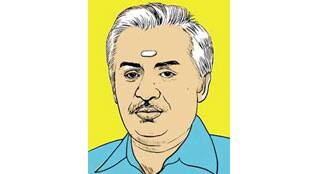*வெனிசுலா நாட்டில் இருந்து வெங்கடேஷ் ஏன் இந்திய பொருட்கள் உலக சந்தையில் சீனா போல அதிகம் இல்லை என்று கேட்டுள்ளார். சீனாவும் இந்தியாவும் வேகமாக வளருகின்றன என்றாலும் சில வேறுபாடுகள் இருக்கின்றன. சீனா உற்பத்தி துறையில் அதிக முன்னேற்றம் கண்டுள்ளது. இந்தியா சேவைத்துறையில் முன்னணியில் உள்ளது. கணினி மென்பொருள், வாடிக்கையளர் அழைப்பு சேவை, ஆடை அணிகலன் உணவு பொருள் உற்பத்தியில் நமது பங்களிப்பு உலகில் பெருமளவு உள்ளது....
--:சுவாமிநாதன் ,யுனைடெட் கிங்டம்
*நம் நாட்டில் பொருளாதாரம் நன்றாக இருப்பதாக இந்த கட்டுரை குறிப்பிடுகிறது. நான் இதை மறுக்கிறேன் , அதற்கான காரணம் கீழ்கண்ட கேள்விகள் நாட்டில் கரூப்பு பணம் மிகையாக உள்ளது , இது நல்ல பொருளாதாரத்துக்கு அறிகுறியா ? லஞ்சமாக சேர்த்த பணம் வெளி நாடுகளில் இருந்து உள் நாட்டுக்கு எளிதான முறையில் கொண்டு வரும் வகையில் சட்டங்கள் மாற்றபடுகின்றன IPL cricket ஊழல் என்னவாயிற்று ? இப்போது எல்லோரும் அதை மறந்து விட்டனரா ? வெளிநாட்டு பணம் உள் நாட்டில் முதலீடு செய்யும் வகையில் real estate துறை முறைபடுதபடாமல் உள்ளது ...இதனால் கருப்பு பணம் முதலீடு செய்யும் வங்கிகளாக நிலங்களும் வீடுகளும் மாறி விட்டன ..இவற்றின் காரணமாக மக்களின் வாங்கும் சக்தி பெருமளவு குறைந்துவிட்டது....இப்போது மக்கள் கடன் வாங்கித்தான் ஆகவேண்டும் என்ற நிலைக்கு தள்ளபடிருக்கிரர்கள்..இன்னும் இரண்டு வருடத்துக்குள் நம் நாடு மேற்கத்திய நாடுகளை போல் நிலைக்கு தள்ளபடுவதற்கான எல்லா அறிகுரிகளும் தெரிகின்றன... நாங்கள் குடும்பங்கள் பற்றி கூறியுள்ள கருத்துகள் உண்மை ...அனால் காலம் கடந்து விட்டதாக நினைக்கிறேன்.....damage has been done..everybody i talk to now a days is heavily invested in gold or real estate..the ponzi scheme is leading to people leaving normal work life and becoming real estate agents... that's a sign of eleventh hour in drama thats about to end..ராஜா - கோவை
*Dear Venkat, I do have the same concern like you. The reason behind this is China's Economic Policies, for example Economies of Scale (Mass Production) and their Polical Policies. These two are two (strong) extremes in China. Here, India has too much of Democratic and Economic Policies are not sound enough like China. China has vision to keep their product everywhere in the world and wish to dominate the world. India does not have this intention. Almost everyone knows that China does not produce 'good quality' products, but people have 'no choice'. We have to buy. One more reason, Brand name. India is still not 'recognised' as a 'good brand' in the Global Market though we produce quality than China. Because we do not have popularity like China. Our Economist & PM says that we don't want to be no.1 and we will try our best to be 'self-sufficient'. Just being sef-sufficient will not encourage Export. Other reasons, bureacratic policies in India. Setting up a company is not a easy job in India. We have to cut off this Red Tapism. When I was in Singapore, I tried to avoid buying China made Fan. So I bought fans (Usha Brand) from India. That fan also made in China. I was shocked. We need to produce as much as possible. We need to update our Economic, Foreign policies to compete with Global market. I am sure that China and India will dominate the world in this century. USA, UK, France will be out of scene in this century....Balaji - tashkent
*70% of the indian produce is consumed in india itself.where as 70% of china's produce gets exported.that is why we dont see much of "made in india" any where. a very good article..prasanna - சிகாகோ,
*It is true that we not able to see any "india made" in any part of the world as like china. Some time i can see only in the indian food varities at the market. I travelled a lot and i am presently in venezuela, working along with europeans and americans. They usually ask me why this situation, as both india and china are big markets, but not able to see "india made". Why? Did any body have an answer? Venkat...Venkat - carupano,வெனிசு
**மேற்கூறிய அனைத்து தகவல்களும் நிதர்சனமான உண்மை...., உதாரணம் எங்க தாத்தா பாட்டி.. குடும்பத்தையும், தங்கள் உறவினர்களையும், அதன் மூலம் தங்கள் கிராமத்தையும் நன்றாக பராமரித்து வந்தனர்...., அவ்வாறு தற்போது இருக்கும் அரசியல்வாதிகள் யாரும் பிபற்றுவதில்லை..., அதற்க்கு நேர் மாறாக தங்கள் பையில் எவ்வளவு தேறும் என்றே உள்ளனர்...., முன்னோர்கள் சொல்லிய நல்ல வழிப்பாதையை பின்பற்றினால் நாட்டின் பொருளாதாரம் நிச்சயமாக உயர்வடையும்......கணேஷ் - மாலத்தீவுகள்
*இது ஒரு நல்ல கட்டுரை. தெளிவாக எழுதப்பட்டுள்ளது ..நமது மக்கள் தொகைக்கு சேமிப்பே சரியானது ..அமெரிக்காவை போல் வாழ நினைத்தால் நமக்கு பிரச்சினை தான்--தாஸ் - லாஸ்ஏஞ்செலஸ்
-
Nobel Prize winner does not mean he has understood everything. Indians are very good at patting themselves at every opportunity. When somebody in the world takes our methods to task we become angry.Our economy is very weak in foundation. Technically we are at the lowest level. I have not seen any "india made" item in any US store but see 90% of the items in stores being made by China. Professors are good for lecturing only, since they have become so for non-performance. We should not live in dreams. If Kanakasabapathy can bag a Nobel Prize, then let him talk. Ravindran-கரண்ட்ப்ரைரிt
